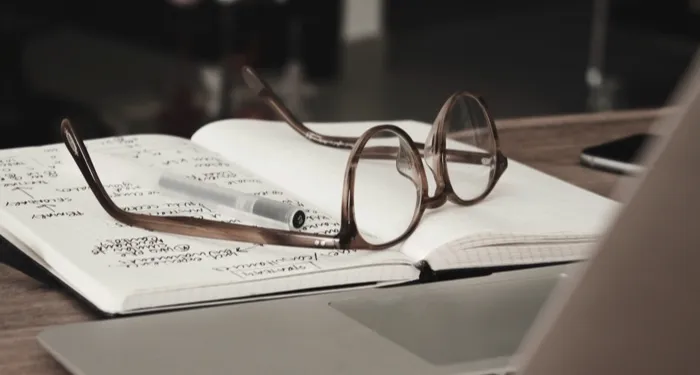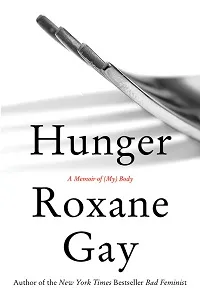
How Roxane Gay’s HUNGER Helped Me Write About My Different Ability
This content contains affiliate links. When you buy through these links, we may earn an affiliate commission.
Reading Roxane Gay’s Hunger: A Memoir of (My) Body was the first time I began to unapologetically look at my body as being something other than deviant. Partially paralyzed due to “complications at birth,” for many years I struggled to accept my body in its authentic form. I’d often find myself questioning romantic relationships, professional undertakings, and responsibilities of motherhood based on anxieties I’d created due to its lack of ability. I perceived my body as a hindrance to the manifestation of the me that I had dreams of becoming; dreams I generally deferred because of misgivings about my body.
Becoming a writer is one of those dreams. A blogger for the past four years, writing is my way of practicing my feminist activism. Challenging my marginalization as a cisgender Black woman has always been a relatively easy process for me. Writing about my life as a differently abled individual, on the other hand, is a different story. When writing about my paralysis, I feel as if I’m not being real enough to the experiences and emotions that I’m attempting to convey—Hunger has helped to change all of that for me.
Without giving anything away, Hunger is Gay’s personal narrative journey detailing her experiences struggling with obesity, racism, and other acts against her body, derived from being raped as a child. The best selling author intimately explores concepts of representation and body agency through the exposure of her past physical traumas.
 What inspires me the most about Hunger is the way that it’s written. Gay has never been shy when it comes to honesty and speaking her truth (which is why I love her work), but Hunger is more than that for me. Gay’s willingness to be upfront and honest about her experiences, as well as her conviction to write about them from such an authentically raw place, is inspiring to me. I also love that her writing is relatable. Gay’s experiences with her body may not be completely parallel to mine, and yet I can feel the authenticity of her words. As someone who is struggling to find my voice when it comes to having agency over my own body, reading Gay’s memoir has been like taking a creative writing course on how to write about dealing with past trauma.
There have been many attempts at writing about my body. After the birth of my daughter, I wrote a piece about the difficulty and fear of having to explain to her what paralysis was and the reactions others can have towards people who looked like me. While those in my circle received the article well, I still felt and continue to feel a sense of vulnerability and protection over that post more than any other post I’ve ever written. Similarly, a year ago, I wrote a social media post advertising a series I would write about my life living as a differently abled Black woman.
Though at the time I was extremely excited about the series, my fear of exposing my body to the world has kept me from finishing the first piece. But, reading Hunger, I’m no longer afraid to share this part of me. I have realized that by beginning to share my experiences (as scary as that may be), I have the opportunity to influence others in the same way that Roxane Gay continues to influence me.
Since reading Hunger, my work on disability within Black feminism has come a long way. I’m slowly allowing myself to explore than part of my identity, no matter how painful it sometimes has been. And, though I’m making progress, that’s all it is—progress. I’m not yet entirely “whole and healed” on the subject of my body. And I’m not going to give it a time table either. Of the many things I’ve learned from reading Roxane Gay‘s memoir, the most important is that healing is a process that cannot be defined by time, and never to be afraid of telling your truth.
What inspires me the most about Hunger is the way that it’s written. Gay has never been shy when it comes to honesty and speaking her truth (which is why I love her work), but Hunger is more than that for me. Gay’s willingness to be upfront and honest about her experiences, as well as her conviction to write about them from such an authentically raw place, is inspiring to me. I also love that her writing is relatable. Gay’s experiences with her body may not be completely parallel to mine, and yet I can feel the authenticity of her words. As someone who is struggling to find my voice when it comes to having agency over my own body, reading Gay’s memoir has been like taking a creative writing course on how to write about dealing with past trauma.
There have been many attempts at writing about my body. After the birth of my daughter, I wrote a piece about the difficulty and fear of having to explain to her what paralysis was and the reactions others can have towards people who looked like me. While those in my circle received the article well, I still felt and continue to feel a sense of vulnerability and protection over that post more than any other post I’ve ever written. Similarly, a year ago, I wrote a social media post advertising a series I would write about my life living as a differently abled Black woman.
Though at the time I was extremely excited about the series, my fear of exposing my body to the world has kept me from finishing the first piece. But, reading Hunger, I’m no longer afraid to share this part of me. I have realized that by beginning to share my experiences (as scary as that may be), I have the opportunity to influence others in the same way that Roxane Gay continues to influence me.
Since reading Hunger, my work on disability within Black feminism has come a long way. I’m slowly allowing myself to explore than part of my identity, no matter how painful it sometimes has been. And, though I’m making progress, that’s all it is—progress. I’m not yet entirely “whole and healed” on the subject of my body. And I’m not going to give it a time table either. Of the many things I’ve learned from reading Roxane Gay‘s memoir, the most important is that healing is a process that cannot be defined by time, and never to be afraid of telling your truth.
 What inspires me the most about Hunger is the way that it’s written. Gay has never been shy when it comes to honesty and speaking her truth (which is why I love her work), but Hunger is more than that for me. Gay’s willingness to be upfront and honest about her experiences, as well as her conviction to write about them from such an authentically raw place, is inspiring to me. I also love that her writing is relatable. Gay’s experiences with her body may not be completely parallel to mine, and yet I can feel the authenticity of her words. As someone who is struggling to find my voice when it comes to having agency over my own body, reading Gay’s memoir has been like taking a creative writing course on how to write about dealing with past trauma.
There have been many attempts at writing about my body. After the birth of my daughter, I wrote a piece about the difficulty and fear of having to explain to her what paralysis was and the reactions others can have towards people who looked like me. While those in my circle received the article well, I still felt and continue to feel a sense of vulnerability and protection over that post more than any other post I’ve ever written. Similarly, a year ago, I wrote a social media post advertising a series I would write about my life living as a differently abled Black woman.
Though at the time I was extremely excited about the series, my fear of exposing my body to the world has kept me from finishing the first piece. But, reading Hunger, I’m no longer afraid to share this part of me. I have realized that by beginning to share my experiences (as scary as that may be), I have the opportunity to influence others in the same way that Roxane Gay continues to influence me.
Since reading Hunger, my work on disability within Black feminism has come a long way. I’m slowly allowing myself to explore than part of my identity, no matter how painful it sometimes has been. And, though I’m making progress, that’s all it is—progress. I’m not yet entirely “whole and healed” on the subject of my body. And I’m not going to give it a time table either. Of the many things I’ve learned from reading Roxane Gay‘s memoir, the most important is that healing is a process that cannot be defined by time, and never to be afraid of telling your truth.
What inspires me the most about Hunger is the way that it’s written. Gay has never been shy when it comes to honesty and speaking her truth (which is why I love her work), but Hunger is more than that for me. Gay’s willingness to be upfront and honest about her experiences, as well as her conviction to write about them from such an authentically raw place, is inspiring to me. I also love that her writing is relatable. Gay’s experiences with her body may not be completely parallel to mine, and yet I can feel the authenticity of her words. As someone who is struggling to find my voice when it comes to having agency over my own body, reading Gay’s memoir has been like taking a creative writing course on how to write about dealing with past trauma.
There have been many attempts at writing about my body. After the birth of my daughter, I wrote a piece about the difficulty and fear of having to explain to her what paralysis was and the reactions others can have towards people who looked like me. While those in my circle received the article well, I still felt and continue to feel a sense of vulnerability and protection over that post more than any other post I’ve ever written. Similarly, a year ago, I wrote a social media post advertising a series I would write about my life living as a differently abled Black woman.
Though at the time I was extremely excited about the series, my fear of exposing my body to the world has kept me from finishing the first piece. But, reading Hunger, I’m no longer afraid to share this part of me. I have realized that by beginning to share my experiences (as scary as that may be), I have the opportunity to influence others in the same way that Roxane Gay continues to influence me.
Since reading Hunger, my work on disability within Black feminism has come a long way. I’m slowly allowing myself to explore than part of my identity, no matter how painful it sometimes has been. And, though I’m making progress, that’s all it is—progress. I’m not yet entirely “whole and healed” on the subject of my body. And I’m not going to give it a time table either. Of the many things I’ve learned from reading Roxane Gay‘s memoir, the most important is that healing is a process that cannot be defined by time, and never to be afraid of telling your truth.









